Intro
Yeah, sing the song, bro
1.
If the sun refused to shine
I don’t mind, I don’t mind
If the mountains fell in the sea
Let it be, it ain’t me
Alright, I got my own world to look through
And I’m not going to copy you
2.
Now if a 6 turned out to be 9
I don’t mind, I don’t mind
If all the hippies cut off all their hair
I don’t care, I don’t care
Dig, cause I got my own world to live through
And I ain’t going to copy you
Bridge
White-collared conservatives flashing down the street
Pointing their plastic finger at me
They’re hoping soon, my kind will drop and die
But I’m going to wave my freak flag high
Wave on, wave on
3.
Fall mountains, just don’t fall on me
Go ahead on Mr. Businessman, you can’t dress like me
Nobody knows what I’m talking about
I’ve got my own life to live
I’m the one that’s going to have to die
When it’s time for me to die
So let me live my life the way I want to
Outro
Sing on brother
Play on drummer
Contributed by L. E. - 2020/10/14 - 00:19
Language: Italian (Toscano Livornese)
Versione livornese dell'Anonimo Toscano del XXI Secolo
Livornese version by the 21st Century Tuscan Anonymous
Version livournaise de l'Anonyme Toscan du 21ème Siècle
Livornese version by the 21st Century Tuscan Anonymous
Version livournaise de l'Anonyme Toscan du 21ème Siècle
Se 'r zèi putaàso fosse 'r nòve
Dé, càntala sta 'anzone, fratèłło
Se ir zole 'un volesse briłłà
Mimportasega!
Se 'monti 'ascasseno ner mare
Lascialistà, 'nzo mìa io...
Occhèi, perché di mondo io ciormìo dagguardà
E 'un ti voglio di certo 'opià...
Ora, se 'r zèi putaàso fosse 'r nòve
Mimportasega!
Occhèi, se tutti gl'ìppi si tagliàsseno 'apełłi
Mimportasega lo stesso!
Loapìsci? Perché io di mondo ciormìo da vìvecci,
E 'un ti voglio di certo 'opià...
Un impiegato demogristiàno 'ammina péłła strada
E cor zu' ditino di pràstïa mi fa: badavełłolììì...
Sperano 'e la mi' razza mòre presto
Però la mi' bandiera 'ontinua a sventolà
Arta arta, essì sventola arta
E voàrtri, monti, 'ascate, però dé...
'un mi àscate addosso...!
E te forza, mister mènager, comemmé 'un ti pòi vestì
'Un lo sa nessuno diòsa parlo [manco io, frałłàrtro]
Ciò la mi' vita da vìve'
Dé tanto o 'un zo' io vełło 'e deve morì...
Morì quando mi tocca [ir 18 settembre der '70 péłła grònaa]
E ałłora dé fàtemi vìve 'npo' 'omecazzàcc mi pare...!
E te canta, fratełło, e te batterista....
sòòònaaaaaaa !!!!!
Coda inedita
Dé ora se 'un mi dài 've' duètti di fumo
Ti spiàcci'o sur capo la Fènde Stratoàster 'e tanto la devo spiacci'ààà...!
Dé, càntala sta 'anzone, fratèłło
Se ir zole 'un volesse briłłà
Mimportasega!
Se 'monti 'ascasseno ner mare
Lascialistà, 'nzo mìa io...
Occhèi, perché di mondo io ciormìo dagguardà
E 'un ti voglio di certo 'opià...
Ora, se 'r zèi putaàso fosse 'r nòve
Mimportasega!
Occhèi, se tutti gl'ìppi si tagliàsseno 'apełłi
Mimportasega lo stesso!
Loapìsci? Perché io di mondo ciormìo da vìvecci,
E 'un ti voglio di certo 'opià...
Un impiegato demogristiàno 'ammina péłła strada
E cor zu' ditino di pràstïa mi fa: badavełłolììì...
Sperano 'e la mi' razza mòre presto
Però la mi' bandiera 'ontinua a sventolà
Arta arta, essì sventola arta
E voàrtri, monti, 'ascate, però dé...
'un mi àscate addosso...!
E te forza, mister mènager, comemmé 'un ti pòi vestì
'Un lo sa nessuno diòsa parlo [manco io, frałłàrtro]
Ciò la mi' vita da vìve'
Dé tanto o 'un zo' io vełło 'e deve morì...
Morì quando mi tocca [ir 18 settembre der '70 péłła grònaa]
E ałłora dé fàtemi vìve 'npo' 'ome
E te canta, fratełło, e te batterista....
sòòònaaaaaaa !!!!!
Coda inedita
Dé ora se 'un mi dài 've' duètti di fumo
Ti spiàcci'o sur capo la Fènde Stratoàster 'e tanto la devo spiacci'ààà...!
Bella versione, o Anonimo, solo ho qualche dubbio sull'autenticità della coda inedita...
B.B. - 2020/10/14 - 22:23
Caro B.B., comprendo i tuoi dubbi; ma il tutto si è svolto in un'atmosfera notevolmente psichedelica. Ero lì, nel mio candido lettino, quando ho sentito una voce: "O Anonimo...!" "Eh....?" "Anonimo, gnamo svégliati budellodèva, so' Gimi 'Endris..."
L'Anonimo Toscano del XXI Secolo - 2020/10/15 - 09:24
Ma Maicol Gecson non ti viene mai in sogno, nemmeno quando hai mangiato pesante?
B.B. - 2020/10/15 - 09:59
Der Einwand, der Seitensprung, das fröhliche Misstrauen, die Spottlust sind Anzeichen der Gesundheit: alles Unbedingte gehört in die Pathologie.
[Friedrich Nietzsche Jenseits von Gut und Böse - Viertes Hauptstück. Sprüche und Zwischenspiele]
L'obiezione, le scappatelle, l'allegra diffidenza, la voglia di canzonare sono segni di salute: tutto ciò che è incondizionato appartiene alla patologia.
[Friedrich Nietzsche Al di là del bene e del male - Parte quarta. Aforismi e intermezzi]
[Friedrich Nietzsche Jenseits von Gut und Böse - Viertes Hauptstück. Sprüche und Zwischenspiele]
L'obiezione, le scappatelle, l'allegra diffidenza, la voglia di canzonare sono segni di salute: tutto ciò che è incondizionato appartiene alla patologia.
[Friedrich Nietzsche Al di là del bene e del male - Parte quarta. Aforismi e intermezzi]
L’aforisma ( per gli investigatori: è il #154) avrebbe meritato e meriterebbe una citazione in molte circostanze , tra cui, ad esempio, l’attentato a Charlie Hebdo.
Più modestamente, scendendo dalla montagna di Zarathustra, ben vengano le rivisitazioni, le interpretazioni, le interpolazioni, le superfetazioni, le etc. etc. di AT XXI. Eccitano ai più la corteccia cerebrale (a me anche l’amigdala).
Auspicio: che le libere espressioni di questi Anonimi verso gli assoluti siano più frequenti e a ruota libera e che gli Anonimi si moltiplichino a iosa.
Altrimenti sintetizzato da l’ urtimu chiovu da carrozza ( l’ultima ruota del carro ): “scherza co’ santi e lascia stare i fanti”.
Ectoplasma Anacronimo - 2020/10/15 - 11:21
Confesserò una cosa: a Maicol Gècson ci penso a volte, ma quando ci penso mi viene voglia di tradurlo in pisano...
L'Anonimo Toscano del XXI Secolo - 2020/10/15 - 12:45
×
![]()
Note for non-Italian users: Sorry, though the interface of this website is translated into English, most commentaries and biographies are in Italian and/or in other languages like French, German, Spanish, Russian etc.

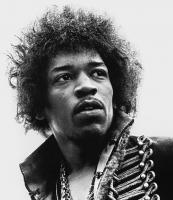
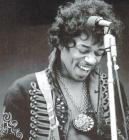

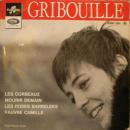
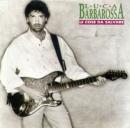

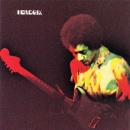
Testo e musica / Lyrics and music / Paroles et musique / Sanat ja sävel: Jimi Hendrix
Album / Albumi: The Jimi Hendrix Experience, Axis: Bold as Love, MCA Records, December 1st, 1967
Single: Stone Free / If 6 was 9, Reprise Records 0853 / Polydor Records NH 539117, September 15, 1969
Il testo della canzone è stato descritto come un "inno individualista". Le parole esprimono in metafora il conflitto della controcultura degli anni sessanta con il "sistema": le dicotomie sociali e culturali tra hippie e "colletti bianchi" conservatori dell'establishment. Iniziando con un potente riff blues, i testi accompagnano una "free-form jam spaziale", con Hendrix a farsi portavoce del movimento giovanile: «I'm the one that's gonna have to die when it's time for me to die/so let me live my life/the way I want to».
Gli scrittori Harry Shapiro e Caesar Glebbeek pensano che le parole del testo, «if the mountains fell into the sea», siano un riferimento al mito della creazione del secondo mondo, narrato nella mitologia Hopi. Il libro Book of the Hopi di Frank Waters (1963) è risaputo che abbia influenzato Hendrix, e molte delle sue canzoni contengono tematiche mitologiche ed immagini relative ai nativi americani; Hendrix stesso era parte dei Cherokee.
Nel corso degli anni sono sorte varie leggende metropolitane basate sulla numerologia circa il significato del numero nove nella canzone e la successiva morte accidentale di Hendrix il 18 settembre 1970. - it.wikipedia
The style of the song has been referred to as "acid-fueled blues". The guitar solo is noteworthy for making innovative use of studio technology for the time, with stereo panning from left to right and vice versa, along with other effects, such as slap echo, fuzzbox distortion, and reverb.
There is some confusion as to whether Hendrix played a flute or a soprano recorder on this track. The credits list Hendrix as playing flute, but recorder player Rodney Waterman and Joe Vanderford of Independent Weekly refer to Hendrix's instrument as a recorder. Early music enthusiast Nicholas S. Lander maintains that "the high tessitura, the typical 'breaking' between octaves, and other characteristics are more suggestive of a soprano recorder."
Compared to the other tracks on Axis: Bold As Love, "If 6 Was 9" suffers from an unusually large amount of tape noise, dropouts, and overall "rough" sound quality. According to Hendrix biographer John McDermott, the master tape used for the album was a quarter-inch open reel tape belonging to bassist Noel Redding, containing an early rough mix of the song. This technically inferior copy (intended for a home tape player) had to be used at the last minute since the album's final stereo master tape had been accidentally lost, and "If 6 Was 9" was the one song that Hendrix and engineer Eddie Kramer could not satisfactorily remix. They reportedly had to use a clothes iron to remove wrinkles in the badly mishandled tape, copied it onto new studio-quality tape, and inserted it into the final album master with no further modification.
The theme has been described as an "individualist anthem". The lyrics portray the underlying conflict of the counterculture of the 1960s: the "social and cultural dichotomies" between the hippies and the "white collared conservative" business world of the establishment. Beginning with a blues riff, the lyrics accompany a "spacey" free-form jam, with Hendrix epitomizing the existentialist voice of the youth movement: "I'm the one that's gonna have to die when it's time for me to die/so let me live my life/the way I want to."
Authors Harry Shapiro and Caesar Glebbeek believe the lyrics, "if the mountains fell into the sea" are a reference to the creation myth of the second world of Hopi mythology. Frank Waters' Book of the Hopi (1963) was known to have influenced Hendrix, and many of his songs contain mythological themes and images related to Native Americans in the United States; Hendrix himself was part Cherokee.
Various urban legends based on numerology have developed around the meaning of number 9 in the song and Hendrix's death in 1970. - en.wikipedia